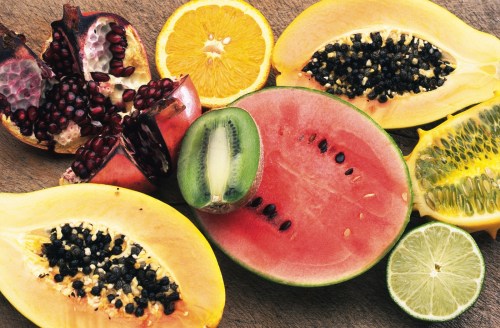2018’s Dirty Dozen list is here—and it’ll make you want to buy *all* organic produce
The Environmental Working Group's 2018 Dirty Dozen list showed a single sample of strawberries had 20 pesticides. Here's what to know about the other produce.

Every year, the Environmental Working Group—a research and advocacy organization for human and environmental health—puts out its list of the “dirtiest” fruits and veggies, ranking pesticide contamination in 47 produce items you likely put in your grocery cart (which is probably filthy, BTW) on the regular. This year pesticides were so prevalent that it had to add a 13th member to the new (baker’s) Dirty Dozen.
Researchers analyzed more than 38,800 nonorganic samples taken by the USDA and the Food and Drug Administration using six key factors—like the “average number of pesticides found on a single sample” and the “total number of pesticides on the crop.” And the study results just might make you buy all organic goods, pronto—at least for strawberries, spinach, nectarines, apples, grapes, peaches, cherries, pears, tomatoes, celery, potatoes, and sweet bell peppers. (Keep in mind that the researchers analyze the produce after washing and peeling it, as you would before cooking.)
A single sample of strawberries had 20 different pesticides. On top of that, spinach was also pretty bad with 1.8 times as much pesticide residue by weight than any other food on the list.
For starters, strawberries topped the list for the third year in a row, with the highest amount of contamination: A single sample had 20 different pesticides. Yikes. Spinach was also pretty bad, with 1.8 times as much pesticide residue by weight than any other food on the list. Those aren’t the only two culprits, though: Unfortunately, 98 percent of samples had at least one pesticide.
The so-bad-we-had-to-include-it 13th item on the list was none other than hot peppers. According to the report, they were contaminated with insecticides toxic to the human nervous system. Because of that, the study authors recommend only buying organic if you eat them frequently—and if organic isn’t an option, cook them before consuming to drop the pesticide levels.
In case you need a reminder of exactly why ingesting pesticides is so bad for you, one reason is that studies show doing so can seriously affect women’s ability to conceive. Women who reportedly ate more than two daily servings of the 14 fruits and vegetables with the highest pesticide residues were 26 percent less likely to have a successful pregnancy compared to women who ate less than one daily serving.
There were some safer options that had low-to-moderate scores that made the Clean 15 list. Avocados were the cleanest of the bunch (thank goodness!), and other goodies you can skip the organic prices on—if you’re picking and choosing what to buy—are bananas, sweet corn, pineapples, cabbage, onions, papaya, asparagus, mango, cantaloupe, kiwi, honeydew, broccoli, eggplant, and cauliflower. So, get to shoppin’—and avoid taking a bunch of pesticides home with you in the process.
This fruit could ease post-workout muscle aches. Or, use this fruit to give your workouts a boost.
Sign Up for Our Daily Newsletter
Get all the latest in wellness, trends, food, fitness, beauty, and more delivered right to your inbox.
Got it, you've been added to our email list.










